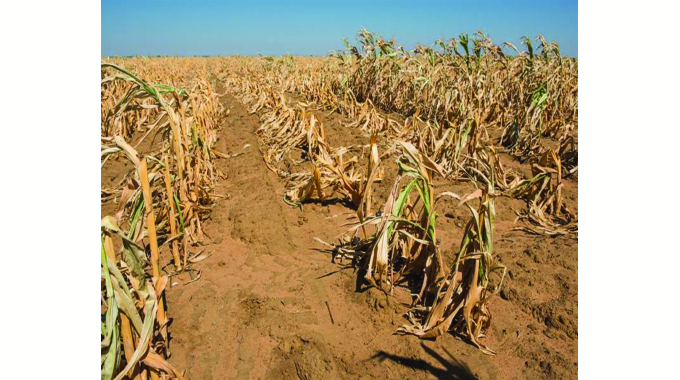Govt pursues insurance for small farmers

Michael Tome Business Reporter
THE Government is working on measures to improve the adoption of agricultural insurance by smallholder farmers in order to reduce production losses emanating from climate-induced shocks.
This comes as the Government continues to seek ways of enhancing proactive response to drought disasters instead of being reactive with the Government turning to donor or humanitarian assistance for relief to affected populations.
Smallholder insurance policies, if successfully adopted, have the potential to promote agriculture’s resilience to climatic shocks, with the sector remaining the mainstay of the Zimbabwean economy.
The frequency and severity of droughts and natural disasters continue to increase all around the world and it is growingly becoming pertinent for vulnerable sectors like agriculture to adopt insurance to ensure continuity.
These climatic shocks are taking a toll on Africa’s livestock and agriculture production due to the coverage gap, making the continent generally unprepared in instances of drought and other natural calamities.
According to the Food and Agriculture Organisation (FAO), agriculture contributes approximately 12 percent to Zimbabwe’s gross domestic product, supplies 60 percent of the raw materials required by industry, and contributes significantly to total export earnings.
As such, droughts severely affect the country’s income streams.
Addressing participants at the African Risk Capacity (ARC) agency’s disaster risk management workshop for media stakeholders, deputy director financial sector policy in the Ministry of Finance and Economic Development, Matthew Sangu said droughts were detrimental to economic growth as it leads to a reduction of the national GDP due to productivity loss.
He said plans were afoot with the insurance regulator to ensure smallholder farmers adopted agriculture insurance.
“We are making sure that smallholder farmers appreciate insurance as insurance to many people is not understood very well, maybe it is a financial inclusion issue, the sector has to be taught so that they start appreciating it, it is a learning curve but we have to let them see how insurance works for their line of production.
“So already we have informed the regulator to develop a regulatory framework because we did not have a framework in relation to index insurance before, and the regulator is seized with this.
“Further, we have resilience building for smallholder farmers and already the regulator is participating in the innovation lab for climate finance where they are trying to introduce a basket of insurance which is composed of not only drought but a basket of insurance,” said Mr Sangu.
He indicated that it was imperative for the agriculture sector to be covered by insurance as droughts do not only affect citizens’ well-being but also lead to unplanned growth in the budget expenditure.
ARC’s head of Government services for East and Southern Africa, Koffi Konin said the idea of agriculture insurance stemmed from the need to improve Africa’s response to a wide range of disasters that have tormented the continent for a while now.
“This is to create prearranged financing so that when drought materialises as Africans we will not be found running around for funding.
“It is for us to get well prepared to eradicate the dire effects of climate change, that is what pushed African leaders to come up with a sovereign fund,” said Mr Konin.
Disaster management expert and Bindura University of Science Education, lecturer in Geography Department, Dr Emanuel Mavhura said it was high time the sector adopted insurance as they might not be able to sustain operations after recurrent drought situations bedeviling the continent.
“In view of the increasing disaster impact, can the humanitarian systems cope with the rising costs? “By 2030, many people could need humanitarian aid, needs are going up while funding from donors is beginning to significantly fall hence the need to adopt mechanisms that shields the sector,” said Dr Mavhura.
He indicated that 2019 has so far been the height of disaster frequency around the world, recording 194 cases of floods, 16 droughts, and 90 storms just in a year.
Insurance, Pension, and Provident Funds (IPEC) Commissioner, Dr Grace Muradzikwa earlier in this year acknowledged the need to adapt to the fast-changing world, assess the changing demographic and leverage technology to achieve efficiencies and improve insurance penetration, particularly in the agriculture sector.
She indicated that the low penetration ratio in terms of insurance in Africa was an average of three percent, therefore there was need to collaborate and ensure that the continent is empowered.
“It is also true that we cannot talk about an empowered continent without talking about food sustainability and agriculture’s share of insurance which is below three percent. Thus agriculture insurance is a low-hanging fruit for all of us as we try to climate-proof agriculture and ensure food sustainability. Our efforts should be to encourage relevant products that target vulnerable households,” she said
This enables the country to build resilience, strengthen its disaster risk management systems, and access rapid and predictable financing in the event of a disaster, thereby ensuring food security and the livelihoods of vulnerable populations.










Comments